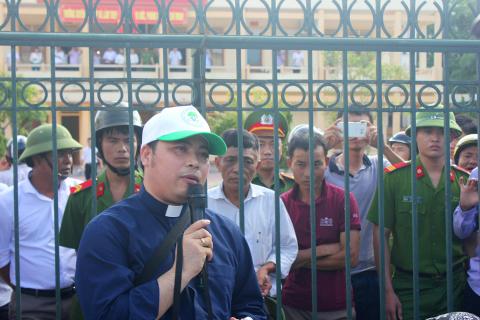Hundreds of Vietnamese fishermen have filed claims seeking compensation from a Taiwanese steel company that acknowledged its toxic chemicals caused a massive fish kill, a local priest helping the fishermen said yesterday.
The factory, owned by Formosa Ha Tinh Steel Corp (台塑河靜鋼鐵興業), said in June that it was responsible for the pollution that killed large numbers of fish off the central Vietnamese coast in April, and pledged to pay US$500 million to clean it up and compensate affected people.
The pollution created the nation’s worst environmental disaster, devastating the regional fishing and tourism industries, and sparked protests in Vietnam.

Photo: Reuters
Catholic priest Dang Huu Nam, who led the group of fishermen, said 506 petitions had been submitted to the People’s Court in Ky Anh town, Ha Tinh Province, where the massive fish kill occurred.
“Based on the fact that Formosa admitted their mistake, based on the Vietnamese laws and the losses suffered by the fishermen, they have submitted their claims and they demand that Formosa be closed and compensate their losses, as well as material and health losses they may suffer in the future,” Nam said by telephone from the courthouse.
Local court officials were not available for comment.
The priest said many more fishermen are completing their files and he expected more than 100,000 fishermen to file petitions.
He said the fishermen on Monday traveled 200km in 15 buses to the People’s Court in Ky Anh, which received 199 petitions on Monday and another 307 yesterday.
About 5,000 people from the town gathered outside the courthouse on Monday to show their support, he said.
Nam said the court would decide whether to process or reject their claims, or refer their cases to a higher authority.
Under Vietnamese law, the claims must be filed individually.
Lawyer Tran Vu Hai said the fishermen’s actions to file their claims may not lead to their cases being brought to trial, but could open a way for Formosa and the fishermen to “talk directly with each other” for a negotiated deal.
An estimated 115 tonnes of fish washed ashore along more than 200km of the central coast in April, the government said in a report to the National Assembly in July.
The disaster harmed the livelihoods of more than 200,000 people, including 41,000 fishermen, it said.
Formosa Ha Tinh’s steel complex includes a steel plant, a power plant and a deep sea port.

Sweeping policy changes under US Secretary of Health and Human Services Robert F. Kennedy Jr are having a chilling effect on vaccine makers as anti-vaccine rhetoric has turned into concrete changes in inoculation schedules and recommendations, investors and executives said. The administration of US President Donald Trump has in the past year upended vaccine recommendations, with the country last month ending its longstanding guidance that all children receive inoculations against flu, hepatitis A and other diseases. The unprecedented changes have led to diminished vaccine usage, hurt the investment case for some biotechs, and created a drag that would likely dent revenues and

Global semiconductor stocks advanced yesterday, as comments by Nvidia Corp chief executive officer Jensen Huang (黃仁勳) at Davos, Switzerland, helped reinforce investor enthusiasm for artificial intelligence (AI). Samsung Electronics Co gained as much as 5 percent to an all-time high, helping drive South Korea’s benchmark KOSPI above 5,000 for the first time. That came after the Philadelphia Semiconductor Index rose more than 3 percent to a fresh record on Wednesday, with a boost from Nvidia. The gains came amid broad risk-on trade after US President Donald Trump withdrew his threat of tariffs on some European nations over backing for Greenland. Huang further

CULPRITS: Factors that affected the slip included falling global crude oil prices, wait-and-see consumer attitudes due to US tariffs and a different Lunar New Year holiday schedule Taiwan’s retail sales ended a nine-year growth streak last year, slipping 0.2 percent from a year earlier as uncertainty over US tariff policies affected demand for durable goods, data released on Friday by the Ministry of Economic Affairs showed. Last year’s retail sales totaled NT$4.84 trillion (US$153.27 billion), down about NT$9.5 billion, or 0.2 percent, from 2024. Despite the decline, the figure was still the second-highest annual sales total on record. Ministry statistics department deputy head Chen Yu-fang (陳玉芳) said sales of cars, motorcycles and related products, which accounted for 17.4 percent of total retail rales last year, fell NT$68.1 billion, or

Macronix International Co (旺宏), the world’s biggest NOR flash memory supplier, yesterday said it would spend NT$22 billion (US$699.1 million) on capacity expansion this year to increase its production of mid-to-low-density memory chips as the world’s major memorychip suppliers are phasing out the market. The company said its planned capital expenditures are about 11 times higher than the NT$1.8 billion it spent on new facilities and equipment last year. A majority of this year’s outlay would be allocated to step up capacity of multi-level cell (MLC) NAND flash memory chips, which are used in embedded multimedia cards (eMMC), a managed